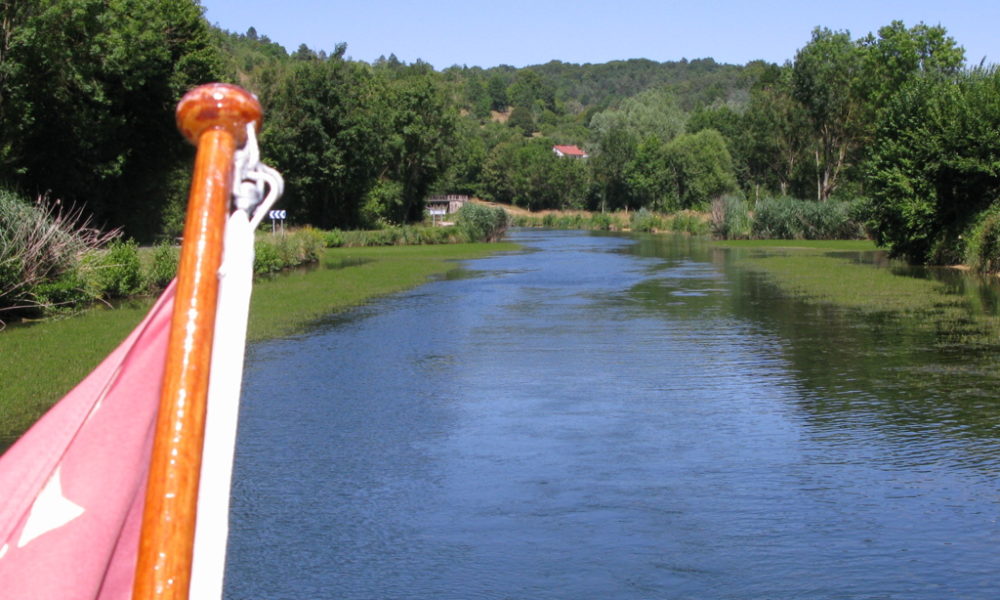
Our first serious aquaintance with seagrass
48° 40′ 8.2812”N 4° 44′ 3.1596” E
July 9, 2015
At the baker in Orconte they have a plastic-cup and a sign on the counter like in other countries, you know saying “Support the Salvation Army” or other organisations. On the Orconte-baker’s it says: “For the baker’s holiday”.
We say good-bye to our British friends. We are on to further adventures. Our first experience however is, that when we get to the first lock of the day, nothing works. We were at the first lock of the canal between Champagne and Burgundy equipped with a remote control, like a simple TV remote control, and it’s job is to manage locks, have them open, have the water emptied, so the lock is ready, when we arrive inside the gate.
But today’s first lock light is not red, and it does not change to green, when we use our remote control, which usually indicates that our signal has been received. We agree that the person, who has the job of opening the gates for a new day, has overslept. We still believe this theory.
We call VNF-guard, who assures us, that an employee will arrive promptly at the gate. This holds true, and we can see that the employee is riding to the next locks to make them ready for a new day. Given that most locks are automated, it is a very labour intensive operation that VNF is running. They move the lawns, repair and assist on a large scale. Sometimes we almost feel, that we have a personal assistant available. We only came across three other boats all day. All private boaters. No commercial ships that otherwise have priority to use the system from eight o’clock. The rest of us cannot use the locks until 9 o’clock, so the VNF employees would not open the floodgates until 9:00.
The routines around locks are in place. We spend about 15 minutes, sometimes up to 20 minutes, from the time we have activated the remote control, until we are through the lock. The locks are placed about two kilometres apart from each other.
We have begun to place our ropes closer to each other instead of a rear and a foreword placement. This means that both ropes take tension from the same direction, and it allows a fine control in the locks. All the time we take in the ropes, so the boat is parallel to the lock wall. Gone are the early days of turmoil and experimentation. Now we run uniformly, quiet and controlled lock after lock. Nellie knows her role. Below deck or in the cockpit, so grandma and grandpa can do their job
Six kilometres south of the – as seen from the canal – the grey industrial city St. Dizier we find a berth in Chamouilley. A small town that has invested in a piece of quay with room for for six-seven boats and modern automatic billing system via computer and Visa cards. We go to the quai to early. We experience low ground under the boat, and seagrass is whirled up in large quantities by the propeller. We turn the motor back, but still we probably have a decent amount of aggressive sea grass in the propeller.
We reach berth with a deluge of seagrass behind us. Luck however, comes to the person, who knows how to wait. Our British friends arrive shortly after, and the father, Charlie, takes on his goggles and dives down to check something with the cooling water on his own boat. We ask if he would take a look at our propeller. He comes back with two large handfuls of seagrass.
We ask him to check the generel state of the fouling under Ronja. She has after all not been out of the water for nearly three years. It is fine, it turns out. Presumably because of the fresh water. Finally, we ask Charlie to check the bow thruster, which was not worked since last summer. He does and tells us, that it is fine, no obstacles, no fouling, no seagrass trapped. So it must be a problem with the electric motor.
Lasse and Tialing arrive by the car, they picked up in Epernay after their mini-vacation in Paris, bringing 24 two-litre bottles of water, a new starting battery for Ronja and food for a dinner on the pier in Chamouilley, that despite the unreasonable amounts of sea grass shows up to be a nice little gem of casual nature with playground, picnic tables, benches and provincial idyll.
Log book: Today’s distance: 25 km. Sailed time 9:30 to 15:30 = 6 hours. Locks: 10. Weather: Day mild and good. We start with fleece jackets, but during the morning we get a comfortable temperature. A little sun. A little clouds. Like home.
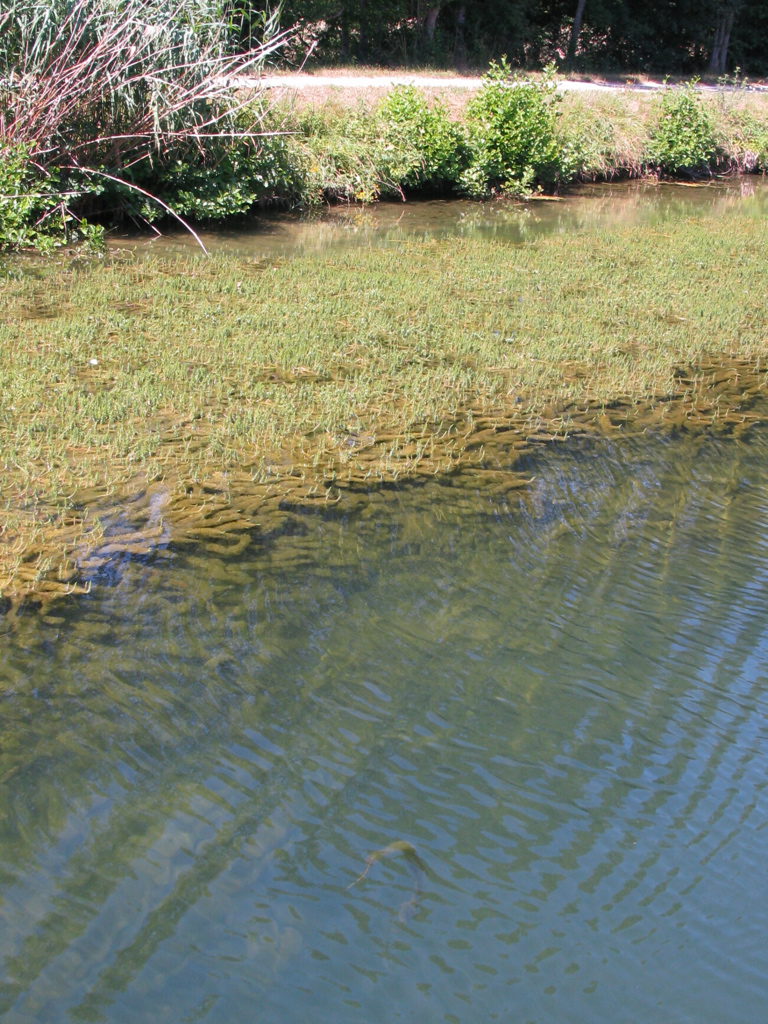
Seagrass grow fast from the brink of the channel. You can’t help wondering if one day it will close the entire channel?
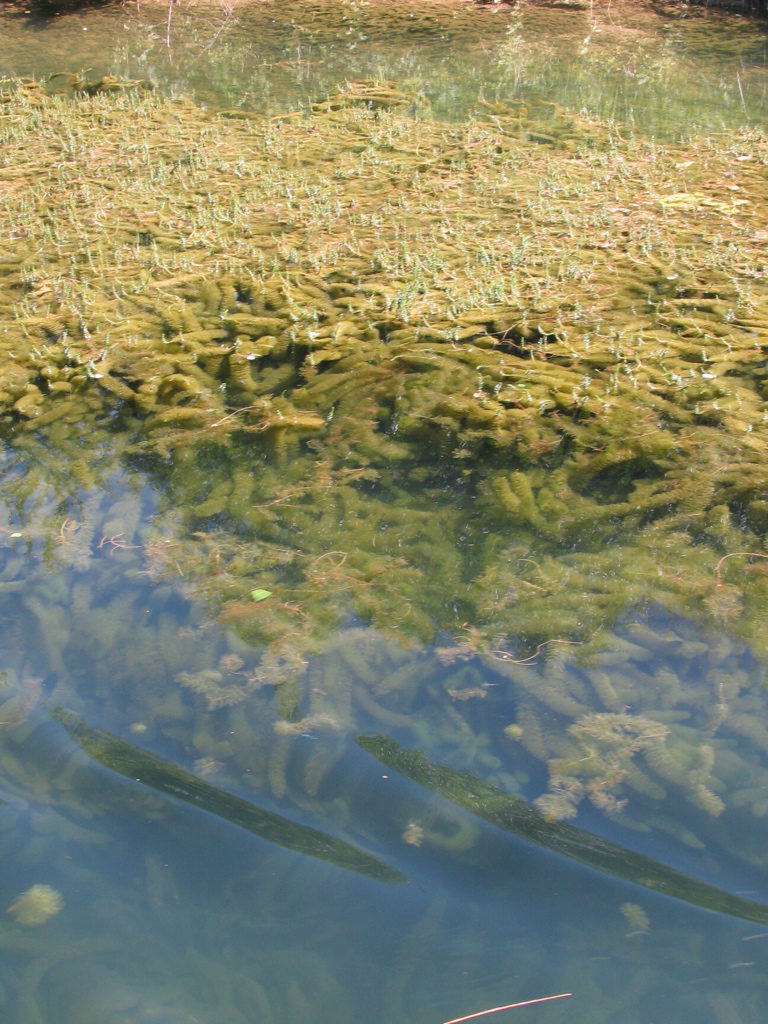
Seagrass also grows rapidly up from the bottom of the channel, and like stiff dreadlocks they go into the proppellar and lowers the speed of the boat
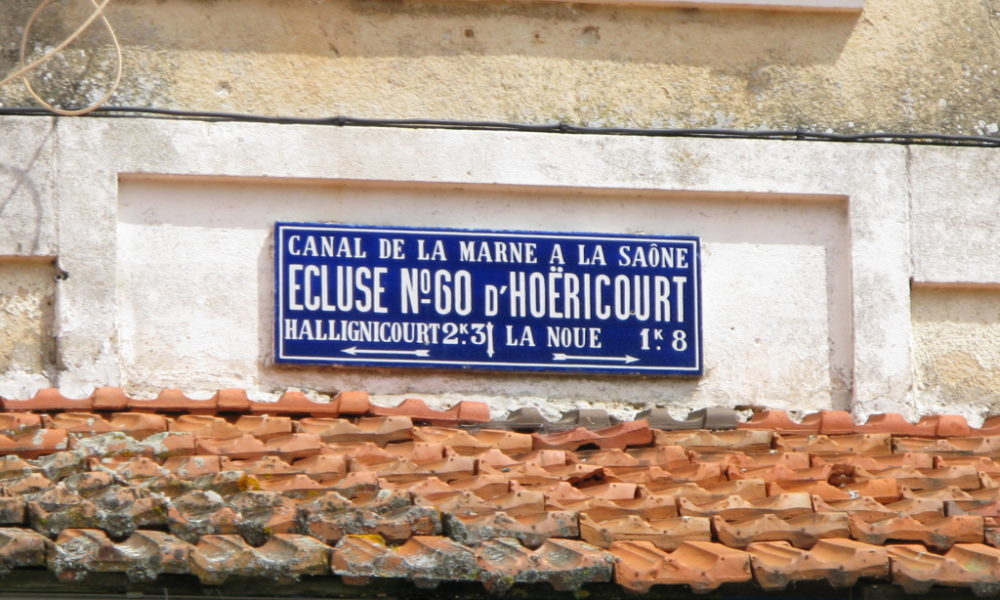
All signposts are in french. All sailors are non-french
48° 43′ 33.9132” N 4° 35′ 8.682” E
Wednesday – July 8, 2016
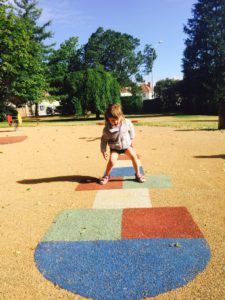
Playing in Vitry-le-Francois
Up early to go in and experience Vitry-le-Francois. We start with the playground at the town hall. Swings, slides and hopscotch. Simple but just what Nellie wants. As we pass the open windows of the town hall – a magnificent piece of classical mansion – we see that in several offices are typewriters. These analog, old-fashioned, mechanical appliances from the previous century. We also see computer screens. Anyway, typewriters in 2015? Sigh.
We eat croissant and drink coffee at a cafe. We buy Lego Friends, and we buy a long-sleeved shirt to protect Nellie against mosquito bites, and as a precaution also buy additional children’s patches, as they has been shown to have a strong psychological effect on itchy mosquito-bites. Especially those patches that have airplanes on them.
We break up at 2 p.m. There is pretty much wind. But we are a sailing boat, created for the roaring oceans. We say goodbye to our American neighbours and wish them good luck with their transmission shaft. In some way we sense that our own story with a broken shaft and many months of traumatic trouble with the French mechanics did not reassure them. Sometimes you have to just leave them to their own experience, even if you have experienced similar.
Now for the Canal entre Champagne et Bourgogne. 224 km with 114 locks and a nearly five-kilometre long tunnel along the way. It was formerly called the channel “Canal entre Marne et Saone” but one bright person at a tourist office probably got the idea to rename the channel to something with champagne and burgundy, so now it is called so – although Vitry has no more champagne-growing, and at the other end there are no single burgundy-fields. It is stagnant peasant country. Cereals and cows.
The French are not consistent. The old name, “Canal entre Marne a Saone” still occur on most signs along the canal – signs that are one hundred percent written in French. All information. All instructions. All brochures on the channel. Everything is in French. Only French. Stupid.
The French would not dream of sailing on the canals themselves. Well, except for one or two. It is Americans, Australians, British, Germans, Belgians and especially Dutch sailors that man the French rivers and channels in a fleet of converted barges, custom-built riverboats, lavish motored and castrated sailboats – including one from Denmark. We meet – virtually – no sailors from France.
Would it then make sense to make signs communicating in English or German? Yes, by God. But the French would not dream of it.
We sail to Orconte and stop at a stump berth surrounded by cornfields, trees, anglers and bird song. The only other boat at the dock are our friends from the UK, a young couple – on leave with their two children. Nice, Nellie is among friends and spends the evening with Bertie and Elisa.
Log-book: Today’s distance: 14 km. Sailed time 14.00 to 17.30 = 3 ½ hours. Locks: 6 pcs. Weather: autom-like. We woke up to the leaves falling from the trees. The wind is cold. The sky is grey. The heat wave is blown away. Back to normal?
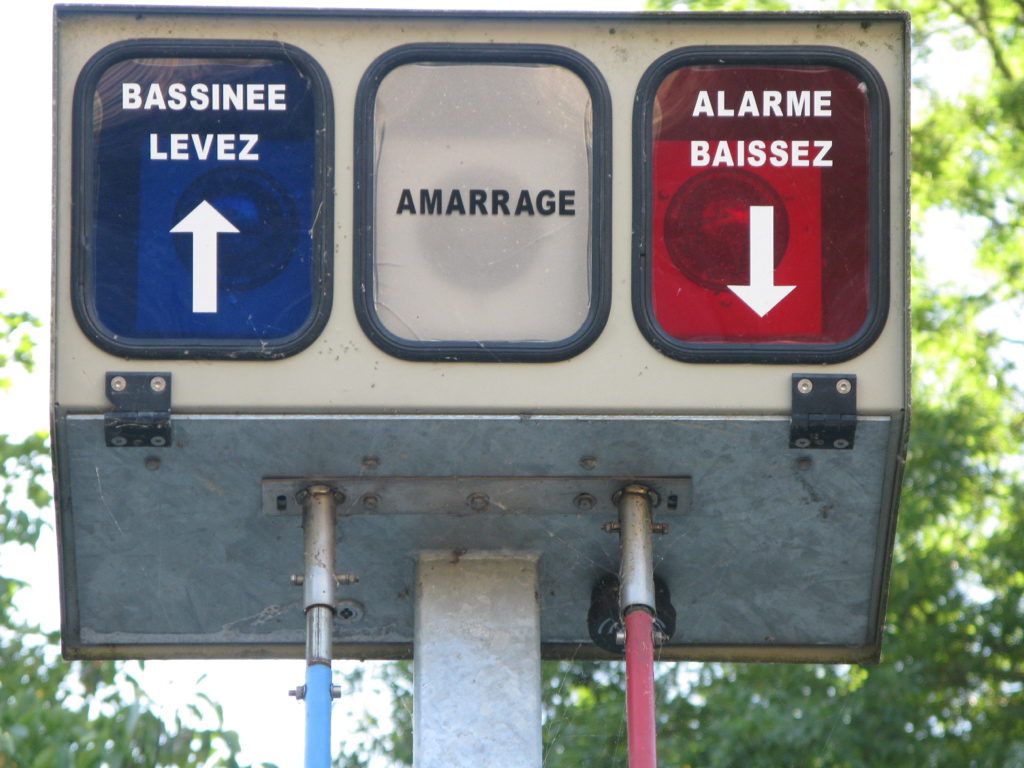
Would it help, if signposts were in english? Yes, because all sailors in the french rivers and canals are non-french
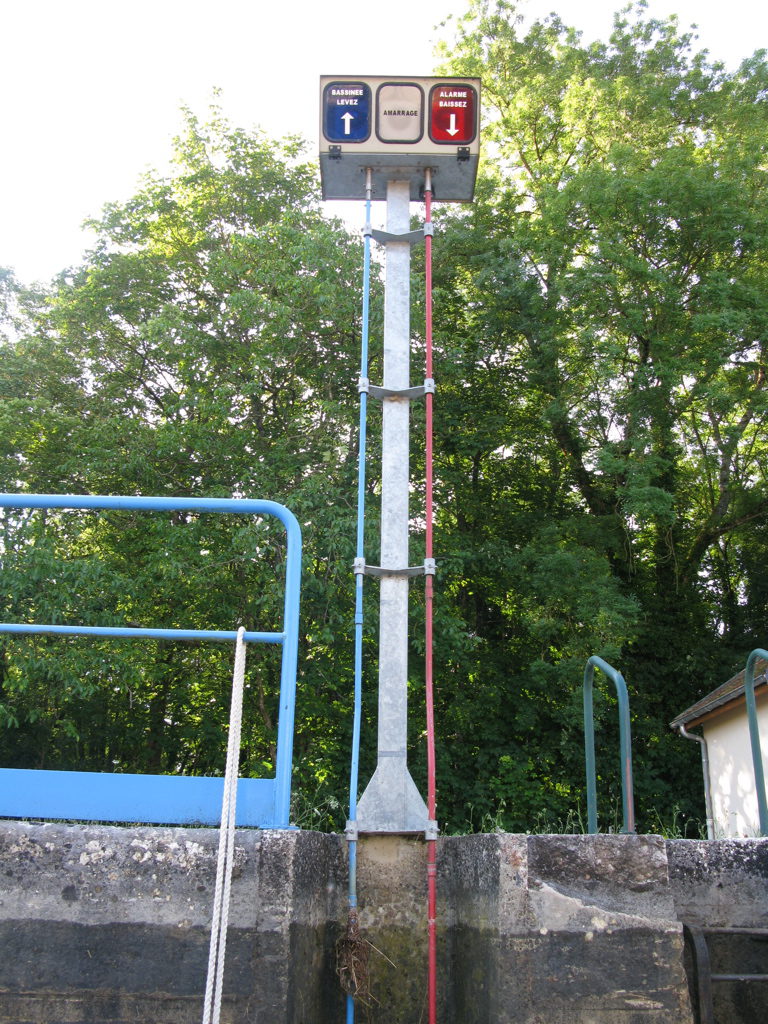
Mechanical lock. Pull up the blue tube, and the lock starts operating
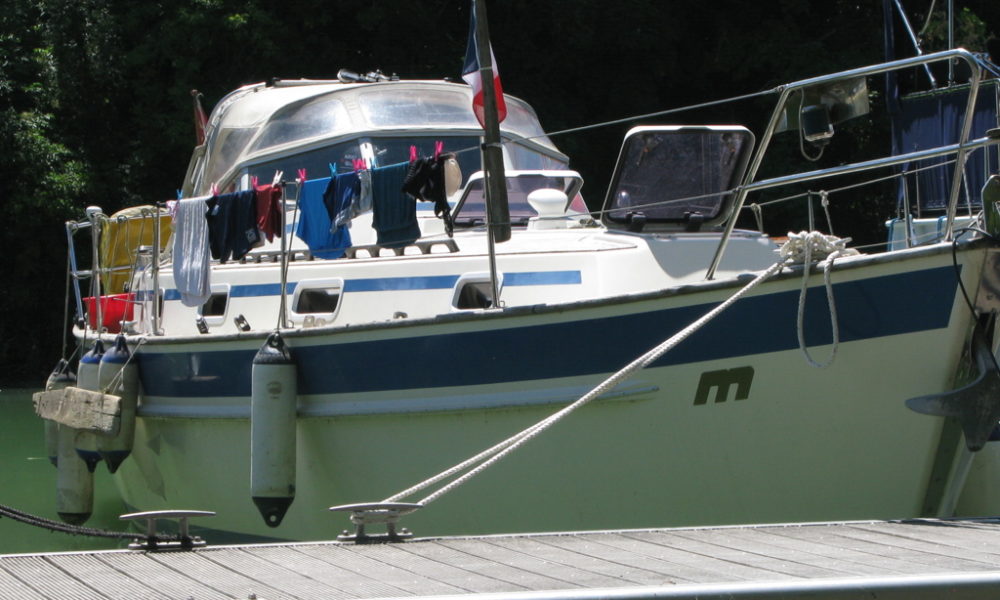
Sailing again. The french do not understand the quality of living by the water
48° 57′ 0.6336” N 4° 21′ 10.1448” E
Tuesday – July 7
We try again. We start from the quay in Chalons en Champagne. We wave good-bye to Lasse and Tianling, who walk with their backpacks to the local railway station to take the train to Paris. Nellie continues aboard Ronja with her grandparents on a new adventure through the French channels. The plan is that Lasse and Tianling will retrieve our car in Epernay and join us after a few days in Paris. – wherever we are at that time.
There was a heron sitting on a branch just 12 meters from Ronja. We tell Nellie that it is the heron, she knows from Frederiksberg Garden back in Denmark, which has come to France to ensure that she is well. A kind of happiness-heron. He will follow us the rest of the journey. Nellie seems skeptic but is not totally dismissive.
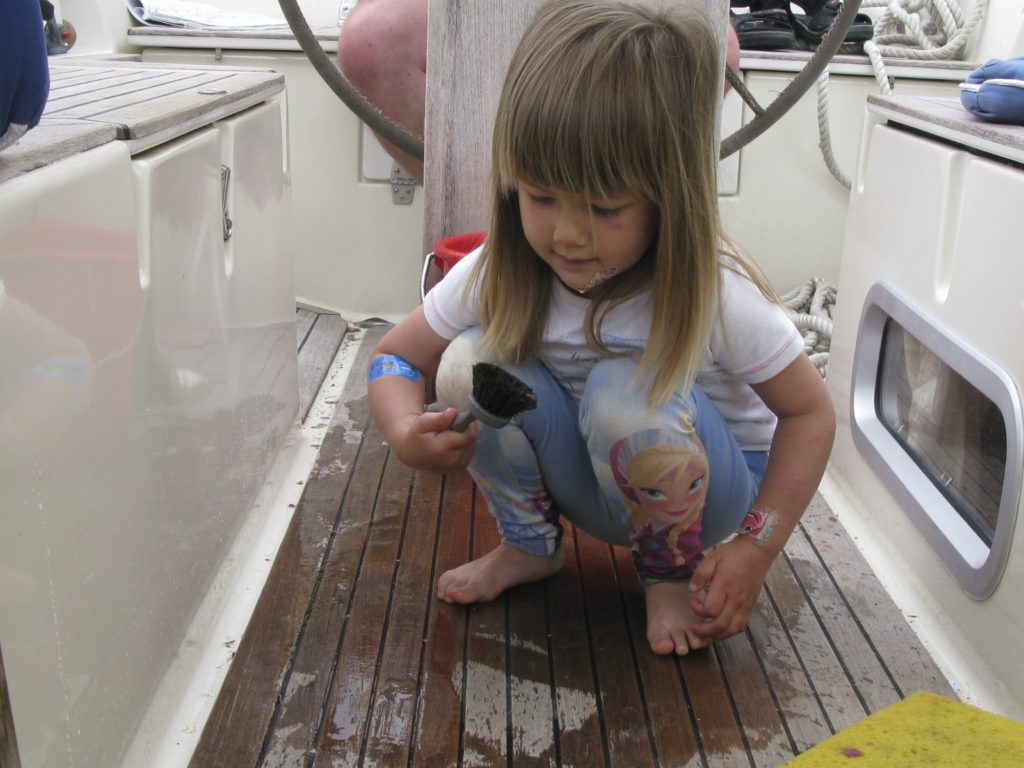
When we arrive at Vitry-en-Francois we see a flying heron. You see, Nellie, your happiness-heron is with you all the way.
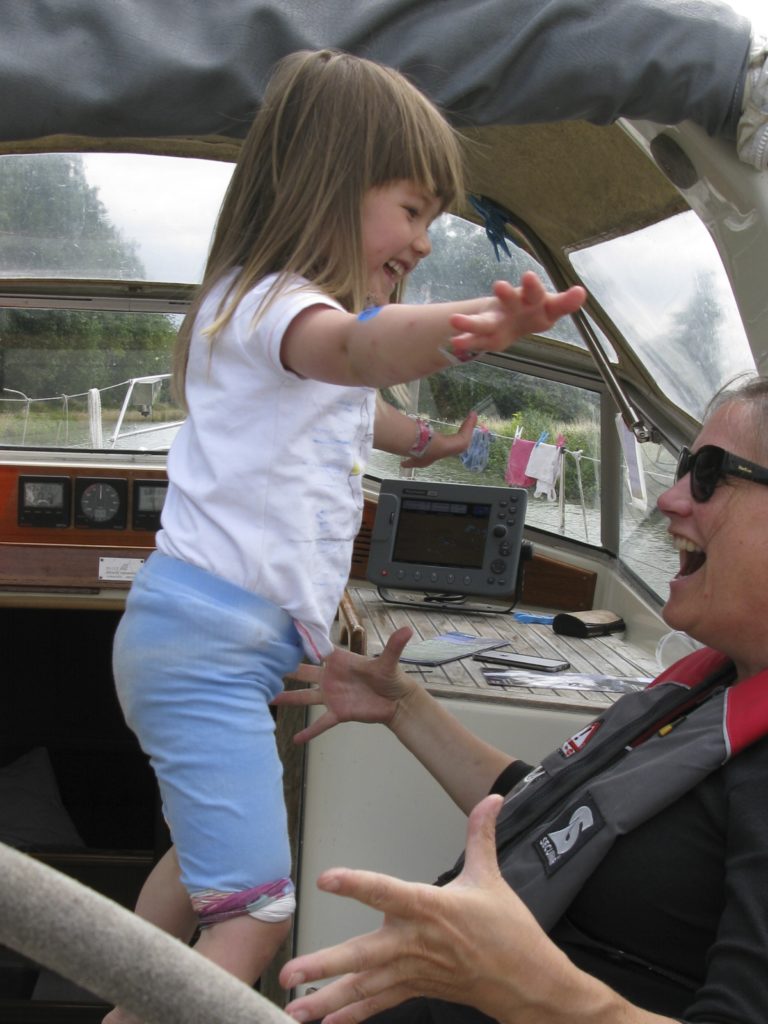
The happiness-heron flyes again, when we outside the minimalist marina of Vitry concludes, that we absolutely shouldn’t enter and find a free space in that little harbour. A sign proclaims that the water depth is 1.60 meters (we protrude 1.75), and there are already 10-12 boats in what looks like 10-12 moorings. An American yells at us. He is outside the marina and invites us to moor with him.
We do. The American pair have sailed in France for 13 years, and just today “the transmission” smoked. Total kaput. We understand their description, that “the transmission” is the same as the part that broke in our boat a year ago. Their accident had happened a kilometre from the port of Vitry. A Dutchman had passed and had towed them in. It turned out that it was the same Dutchman, we the day before had used as a sparring partner against the French mechanics.
Today’s journey has been beautiful, desolate and marked by the usual French picture: The French have not yet understood the quality of living by the water. They are “turning their back on”. They place fields, industrial plants, warehouses and the back of their homes towards the river or canal. Quite the opposite of Holland where all gardens, all houses, all panoramic windows like a natural thing face the water, and the Dutch may well have a car on the street, but it is just as natural also to have a boat out on the water.
The French have nothing. The location of the canals and rivers will be the most expensive land in France in 10-20 years. But the French have not discovered it yet. It is probably culturally determined. Something about rivers and canals have historically been regarded as dirty drains for toilet and industrial waste.
Perhaps we should start buying up the French river locations?
Log-book: Today’s distance: 32 km. Sailed time: 9:30 to 18:00 = 8 1/2 hours. Locks: 8 pcs. Weather: sultry. But after a few days with the heat wave it is a relief with temperatures of “only” 29 and 30 degrees and a slight shower of rain now and then. The lightning bolts, but even if we could use a cleansing thunderstorm, it is never close to us.
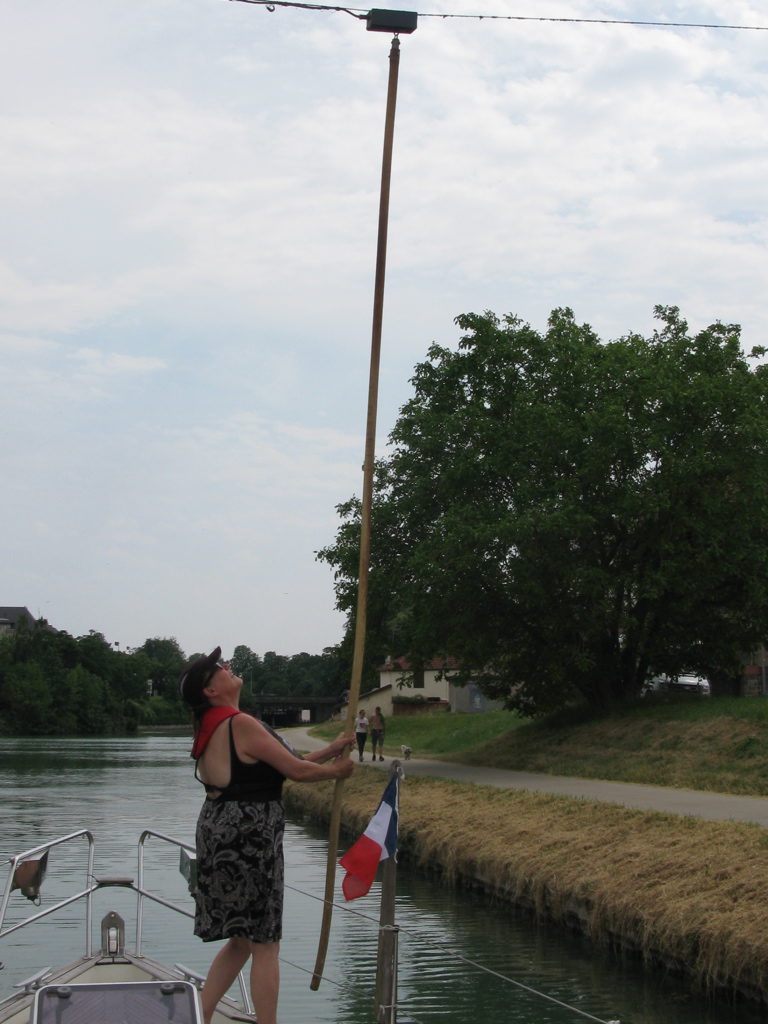
Many ways to open a lock. One of them is to turn a handle hanging down from abowe
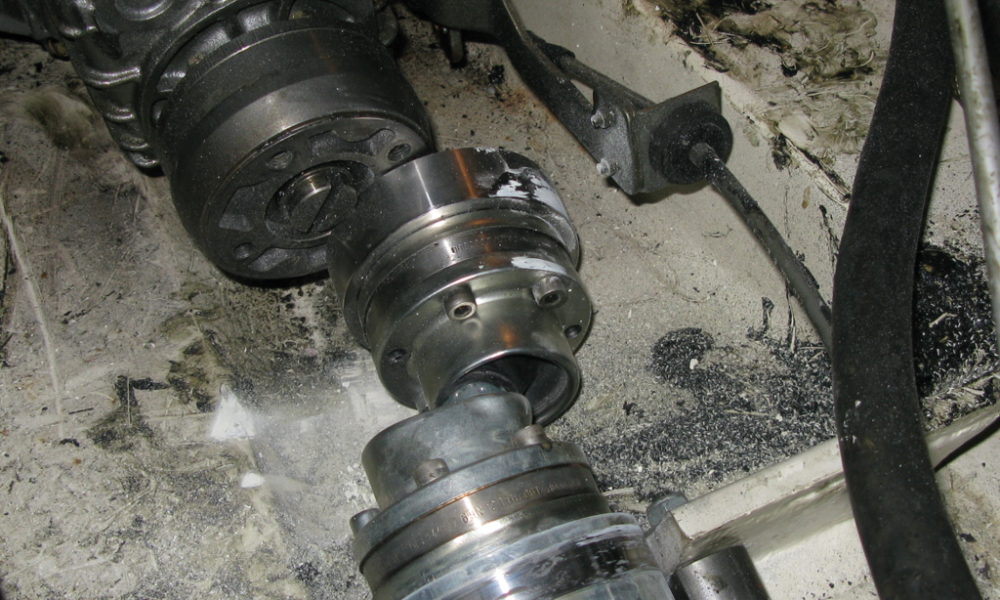
Hearts stand still. Brains refuses to believe it. The motor is broke again!
48° 57′ 0.6336” N 4° 21′ 10.1448” E
Monday – July 6
Krasch! Krasch! Krasch! Hearts are still. The brain refuses to believe it. We are shocked, when we hear the exact same sound from the engine compartment, which forced Ronja in the hands of French mechanics last year and cut off our sailing holiday, even before the first week was over. We don’t doubt: It is the universal joint that is the problem again. It has broken loose.
We see for ourselves, how last year’s tragedy now will be repeated. New mechanics, new waiting period, new parts, new repair. This year’s sailing holiday interrupted. This year after only one day of sailing.
The morning actually started with Per and Kirsten playful to be on the water again, got up early and started the engine to start today’s sailing, even while the rest of the family was still sleeping in the aft and main cabin. Ronja was not ten meters out into the basin, before the terrifying sounds from the engine compartment forced the boat back to the dock.
When we open the engine room we see a chaos of twisted metal and loose bolts. All of the spare parts had broken loose. So much for French mechanics.
As an unexpected surprise that we may yet end up with a bit of luck, the skipper of the Dutch neighbouring boat stuck his head up from his cabin: “Do you need help? I am diesel mechanic. We pinch ourselves – are our neighbour really a diesel mechanics? – and explain to him, that we will certainly need his help, and that we had a bone to pick with a specific French mechanic, who spent months repairing Ronja, only for her to break down after a single day of sailing.
Per gets hold of the harbour master, a young student who is good at English. He is briefed and dials Meca Max Service, and he makes Alain Reinhardt aware of the situation. Disaster! Totally serious! We are the beginning of a desperately short vacation. Totally unacceptable. Something must be done immediately. Tout de suite!
Hey! He is at the boat within less than half an hour. We have never experienced this before.
He jumps into the engine compartment and comes up again soon – with the harbour master as interpreter – to reassure us that it may be a problem, but it is not a serious problem. It can be solved. The replacement part is intact, but the four (or six) bolts, as the brand new universal joint are secured by, has been found to be too short. Therefore, they have twisted free. Such a large part requires a stronger attachment, he explains. We do not need a mechanic to figure that out, but we are pleased, that the disaster apparently may be limited to only one day of repair.
Two mechanics work on it for seven hours. Voila. Now we can sail again. Alain Reinhardt claims, that the new repair will last for many years, adding that today’s repair is to be considered a service. Without charge.
No charge. You bet there is no charge. Rather a warranty claim. We grits our teeth, and with a strained smile we thank him for being ready for rapid deployment. Inside we think: Hell of a truck mechanic. Next time, we must make an extra effort to find a mechanic, who knows about marine engines.
Our Dutch neighbour looks at the engine, whenever the French mechanics are home at their workshop drilling holes for longer bolts. He agrees that the problem is less serious, than it was first thought. But he is not impressed by their skills, and when we in the evening inspect the repair with him and test the engine for an hour with the gears back and forth, he declares that it will probably hold, but it is not a “nice job” they have delivered. Even we can see that.
“Garage mechanic,” snaps the Dutchman. He himself has worked with engines and engineering for major river-projects worldwide.
He stopped working a few years ago, and the decision to retire is the best, he has ever made. He and his wife are now sailing six months a year and spends the rest at home in the Netherlands. His wife whispers to us, that he has far to go, before he is relaxed pace. He is still restless even after two years in retirement.
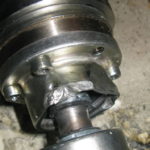
AFTER: You don’t need to be a mechanic to recognize a reparation, that is still bad
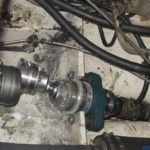
BEFORE: One day and the transmission shaft is broken again. French handycraft. Hrmppf!
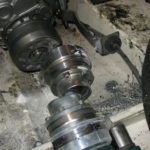
BEFORE: Bend metal and loos bolts meets the eyes in the engine-room
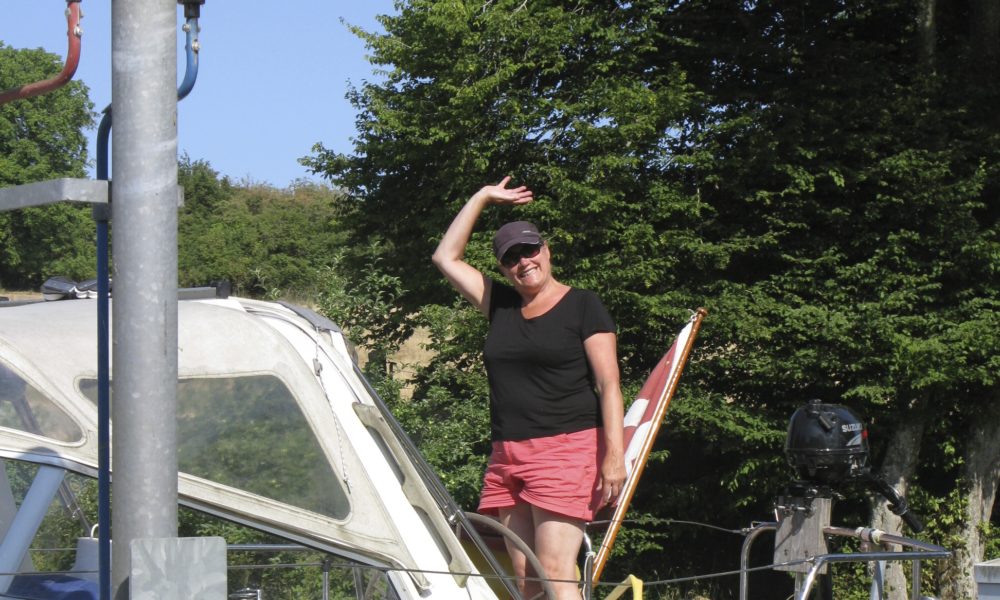
Farewell to Epernay. Hello to new adventures
49° 2′ 49.6348” N 3° 38′ 1.56” E
July 5, 2015
We have agreed with Monsieur Bernard, that we will sail at 9:00: He and his girlfriend are ready to wave good-bye at the quayside. He says tut-tut like a ferry, that departs from land, playing for Nellie and letting us know, that we have been some very special guests. Sure. In a port with a total of three boats, who winter there, we probably paid the lion’s share of his salary for a year, thinks a cynical man from Scandinavia.
It is a great trip. Damn it, it’s a relief to wave goodbye to Epernay, which has “bound us” for almost a year. Finally, we are back on track. Towards new adventures. Every day something new. The family spins. The motor hums pleasant. It was worth the wait. The new parts seem to be worth the money.
Log book: Today’s distance: 40 km. Sailed time: 10:10 a.m. to 17:00 = 7 hours. Locks: 8 pcs. Weather: Heat wave. Today, only up to 34 degrees to 36 degrees on Friday and Saturday.
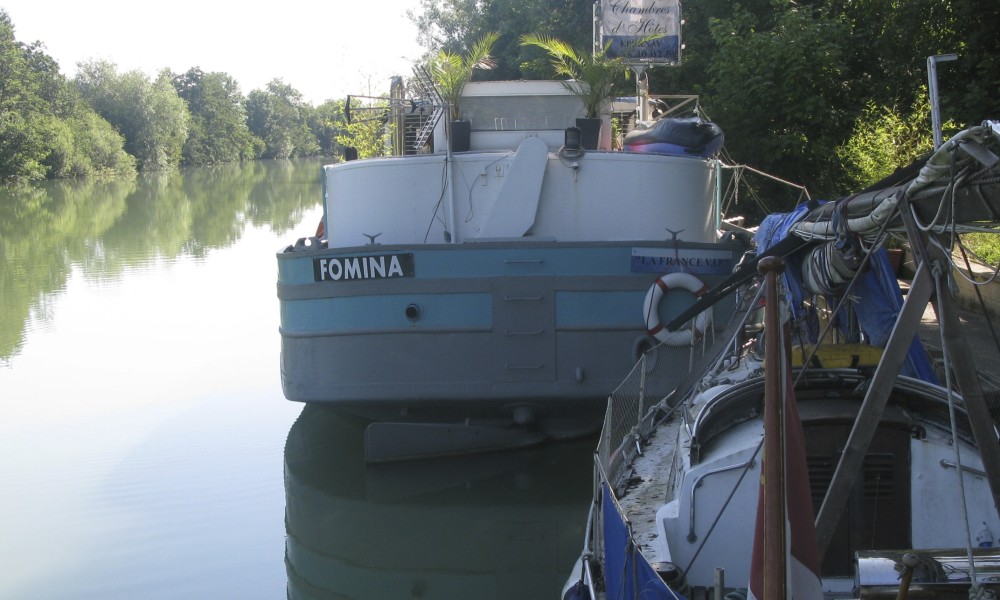
We prepare Ronja on a new summer on the French canals and rivers
49° 2′ 39.6348” N 3° 55′ 1.56” E
July 4, 2015
The day is spent cleaning Ronja, soapy water and algae remover, water tanks and a gigantic shopping in Carrefour and – for Lasse, Tian Ling and Nellie – an excursion to the deep cellars under the champagne producer Mercier, who has so many kilometers of underground passages with fermenting bottles, that they have invested in an underground train to get around.
In the evening we barbecue dinner on the quayside. The sun grilling us from above. The heat wave.
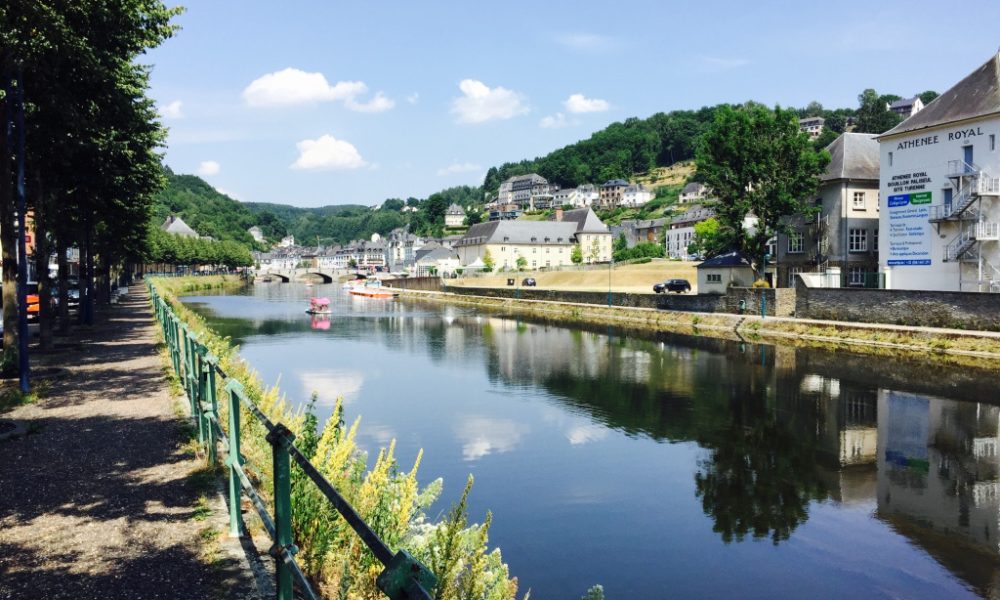
Reunion with Ronja
49° 2′ 49.6348” N 3° 58′ 1.56” E
July 3, 2015
After a late lunch in the town of Bouillon on the border between Belgium and France, we arrive in the late afternoon to Epernay. Great reception.
Port captain, Monsieur Bernard, explains with grand gestures, how he has been fighting against nature’s unpredictable attacks on Ronja through the winter. Five times, the sea level has risen in the Marne River. Way up there, he says, pointing high up the slope over Ronja. Five times he has been out and reinforce the sloped path to keep Ronja clear of the quay.
There has been some progress in the fight, though we must understand, that it has been a struggle against powerful forces. Madame Bernard kisses his cheek and consents: Monsieur Bernard fought and won.
It is more than 11 months ago, we left Ronja in Epernay with engine problems. She seems fine now. Dusty, dirty. But overall in a better state than, when we revisited her last year after an entire winter in a port north of Paris.
We pick Kirsten up at Epernay train station at 9 o’clock p.m. She has had a meeting at the school Friday morning, and therefore she travelled to Epernay by plane and train. We ate a late dinner in the heavy heat wave. Even at midnight it feels like well over 30 degrees.
Let’s find granddads boat in France
49° 2′ 49.6348” N 3° 57′ 1.56” E
July 2, 2015
It is early afternoon, when Per meet Lasse, Tianling and Nellie at Fredericia train station in Denmark. Per had been to a few meetings in the media-company in Vejle, and the others came by train from Copenhagen.
They all enter Per’s car, which will with the air conditioning on full speed allow us to survive the current heatwave and bring us to the good ship Ronja, which are waiting in the Marne river in the champagne capital, Epernay, France.
Fine trip. Good mood. Nellie, who is 3 ½ years old, falls into the rhythm. She sleeps a lot, plays with Tianling. We rest along the way at Moevenpick Hotel in Munster. Excellent dinner, excellent rooms, excellent breakfast. And then off again.